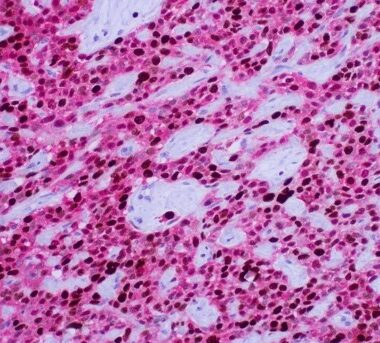Zeta HPV-Infected Tumor Cocktail – DUAL STAIN.
Zeta’s HPV-Infected Tumor Cocktail provides dual staining for p16 INK4a and CDK4 in HPV-related tumors, offering unique value in assessing oncogenic transformation, cell cycle dysregulation, and tumor behavior, particularly in HPV-associated squamous cell carcinomas.
Zeta’s recombinant antibody cocktail contains two defined monoclonals that recognize specific proteins that help assess the prognosis for tumors that have been shown to have previous HPV-infection. p16 INK4a is a tumor suppressor protein involved in the pathogenesis of a variety of malignancies, and is expressed in the nucleoplasm of proliferating cells, functioning as an inhibitor of CDK4. Tumors infected with HPV, particularly the high-risk stains, express high level of P16 protein. The Ki-67 nuclear antigen is associated with cell proliferation. It is found throughout the cell cycle in the G1, S, G2, and M phases; but not the (G0) phase. It is commonly used to grade proliferation rates of tumors. An optimized antibody cocktail for p16 INK4a and Ki-67 is useful in the identification of tumor cells co-expressing both tumor suppression marker P16 (red) and cell proliferation marker Ki-67 (brown) in HPV infected tumors, such as high-grade dysplasia and carcinomas.
| Marker | Expression | Role in Cell Cycle | Clinical Interpretation |
|---|---|---|---|
| p16INK4a | Overexpressed in HPV-transformed cells | Inhibits CDK4/6 → arrests cell cycle | Surrogate marker for oncogenic HPV |
| CDK4 | Expressed in many dividing cells | Phosphorylates Rb → promotes G1/S progression | Marker of cell proliferation and Rb pathway activity |
Zeta’s HPV-Infected Tumor Cocktail can clarify HPV-driven oncogenesis, where p16 INK4a overexpression is a hallmark of high-risk HPV integration. HPV E7 protein inactivates Rb, releasing E2F, leading to compensatory p16 upregulation. CDK4 expression in the same context may suggest incomplete Rb suppression or alternative proliferative mechanisms. Dual staining highlights p16⁺/CDK4⁻ or p16⁺/CDK4⁺ populations, where both can inform about HPV activity vs. alternative drivers.
Additionally, the HPV-Infected Tumor Cocktail can help differentiate tumor subtypes in head and neck squamous cell carcinoma (HNSCC) and cervical cancer where p16⁺/CDK4⁻ typically indicates HPV-positive, more responsive to therapy, better prognosis as opposed to p16⁺/CDK4⁺ which may suggest dual pathway activation or tumor heterogeneity. It can also help clarify ambiguous p16-positive but HPV DNA-negative cases.
Zeta’s DUAL STAIN products provide more information from limited tissues, by seeing two related markers on the same slide while also allowing pathologists to see cellular localization and interaction within the tumor environment. Zeta uses one mouse and one rabbit recombinant monoclonal in each cocktail to allow for differential color results.
Zeta Corporation is a leader in recombinant monoclonal IVD antibodies for immunohistochemistry (IHC) offering 400+ tumor and tissue specific relevant products developed by a pathologist for pathologists. Visit Precision Recombinant Antibodies – IVD Antibodies – About Zeta Corporation (zeta-corp.com) to learn more about Zeta Corporation.

